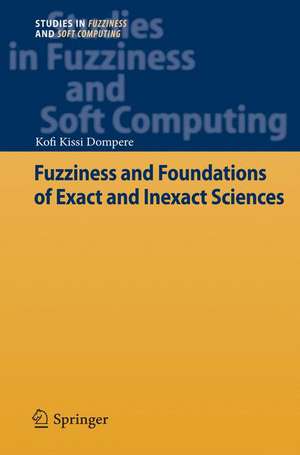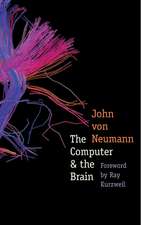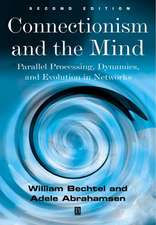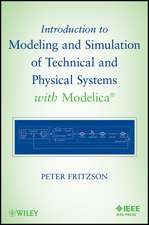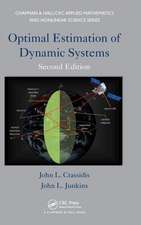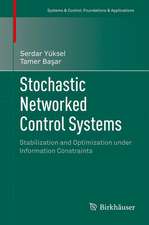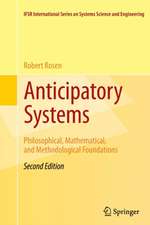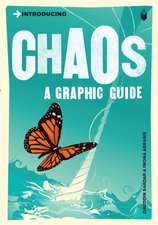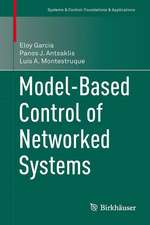Fuzziness and Foundations of Exact and Inexact Sciences: Studies in Fuzziness and Soft Computing, cartea 290
Autor Kofi Kissi Dompereen Limba Engleză Hardback – 24 aug 2012
The general conclusion of this book is that the conditions of the fuzzy paradigm with its laws of thought and mathematics present a methodological unity of exact and inexact sciences where every zone of thought has fuzzy covering.
| Toate formatele și edițiile | Preț | Express |
|---|---|---|
| Paperback (1) | 640.84 lei 6-8 săpt. | |
| Springer Berlin, Heidelberg – 20 sep 2014 | 640.84 lei 6-8 săpt. | |
| Hardback (1) | 647.13 lei 6-8 săpt. | |
| Springer Berlin, Heidelberg – 24 aug 2012 | 647.13 lei 6-8 săpt. |
Din seria Studies in Fuzziness and Soft Computing
- 20%
 Preț: 999.85 lei
Preț: 999.85 lei - 20%
 Preț: 653.06 lei
Preț: 653.06 lei - 20%
 Preț: 872.98 lei
Preț: 872.98 lei - 20%
 Preț: 930.57 lei
Preț: 930.57 lei - 20%
 Preț: 1051.00 lei
Preț: 1051.00 lei - 20%
 Preț: 992.44 lei
Preț: 992.44 lei - 20%
 Preț: 655.85 lei
Preț: 655.85 lei - 20%
 Preț: 1001.86 lei
Preț: 1001.86 lei - 18%
 Preț: 954.14 lei
Preț: 954.14 lei - 20%
 Preț: 330.10 lei
Preț: 330.10 lei - 20%
 Preț: 333.04 lei
Preț: 333.04 lei - 20%
 Preț: 997.56 lei
Preț: 997.56 lei -
 Preț: 391.61 lei
Preț: 391.61 lei - 20%
 Preț: 647.79 lei
Preț: 647.79 lei - 20%
 Preț: 986.01 lei
Preț: 986.01 lei - 18%
 Preț: 958.56 lei
Preț: 958.56 lei - 20%
 Preț: 996.40 lei
Preț: 996.40 lei - 20%
 Preț: 999.35 lei
Preț: 999.35 lei - 15%
 Preț: 646.43 lei
Preț: 646.43 lei - 20%
 Preț: 651.57 lei
Preț: 651.57 lei - 20%
 Preț: 997.89 lei
Preț: 997.89 lei - 15%
 Preț: 641.03 lei
Preț: 641.03 lei - 20%
 Preț: 1009.74 lei
Preț: 1009.74 lei - 20%
 Preț: 992.62 lei
Preț: 992.62 lei -
 Preț: 388.72 lei
Preț: 388.72 lei - 18%
 Preț: 1223.43 lei
Preț: 1223.43 lei - 20%
 Preț: 651.42 lei
Preț: 651.42 lei - 18%
 Preț: 951.59 lei
Preț: 951.59 lei - 18%
 Preț: 948.61 lei
Preț: 948.61 lei
Preț: 647.13 lei
Preț vechi: 808.91 lei
-20% Nou
Puncte Express: 971
Preț estimativ în valută:
123.83€ • 132.42$ • 103.25£
123.83€ • 132.42$ • 103.25£
Carte tipărită la comandă
Livrare economică 18 aprilie-02 mai
Preluare comenzi: 021 569.72.76
Specificații
ISBN-13: 9783642311215
ISBN-10: 3642311210
Pagini: 299
Ilustrații: XXXII, 168 p.
Dimensiuni: 155 x 235 x 20 mm
Greutate: 0.46 kg
Ediția:2013
Editura: Springer Berlin, Heidelberg
Colecția Springer
Seria Studies in Fuzziness and Soft Computing
Locul publicării:Berlin, Heidelberg, Germany
ISBN-10: 3642311210
Pagini: 299
Ilustrații: XXXII, 168 p.
Dimensiuni: 155 x 235 x 20 mm
Greutate: 0.46 kg
Ediția:2013
Editura: Springer Berlin, Heidelberg
Colecția Springer
Seria Studies in Fuzziness and Soft Computing
Locul publicării:Berlin, Heidelberg, Germany
Public țintă
ResearchCuprins
Exact Science, Its Critique of Inexact Science and Rationality in Vagueness.- The Laws of Thought and Exact Science.- The Primary Category, Derived Categories and Scientific World Pictures.- The Organization of Knowledge Production and the Defense of Inexact Sciences.- The Exactness of Inexact Science and the Organization of the Knowledge Production.- Zones of Thought: Reflections on the Theories of Truth.
Textul de pe ultima copertă
The monograph is an examination of the fuzzy rational foundations of the structure of exact and inexact sciences over the epistemological space which is distinguished from the ontological space. It is thus concerned with the demarcation problem. It examines exact science and its critique of inexact science. The role of fuzzy rationality in these examinations is presented. The driving force of the discussions is the nature of the information that connects the cognitive relational structure of the epistemological space to the ontological space for knowing. The knowing action is undertaken by decision-choice agents who must process information to derive exact-inexact or true-false conclusions. The information processing is done with a paradigm and laws of thought that constitute the input-output machine. The nature of the paradigm selected depends on the nature of the information structure that is taken as input of the thought processing. Generally, the information structure received from the ontological space is defective from the simple principles of acquaintances and the limitations of cognitive agents operating in the epistemological space. How then do we arrive and claim exactness in our knowledge-production system?
The general conclusion of this book is that the conditions of the fuzzy paradigm with its laws of thought and mathematics present a methodological unity of exact and inexact sciences where every zone of thought has fuzzy covering.
The general conclusion of this book is that the conditions of the fuzzy paradigm with its laws of thought and mathematics present a methodological unity of exact and inexact sciences where every zone of thought has fuzzy covering.
Caracteristici
The aim of this monograph is to construct an epistemic framework for understanding the differences and similarities of exact and inexact sciences and the methodologies of their analyses and syntheses This monograph demonstrated that the classical paradigm is a derivative of the fuzzy paradigm, which also constitutes the primary category of logical category, and shows the interconnections among axiomatic and empirical foundations of science as well as the role that paradigms play in deriving rules of thought that lead to abstractions of significant conclusions or propositions Written by a leading expert in the field
